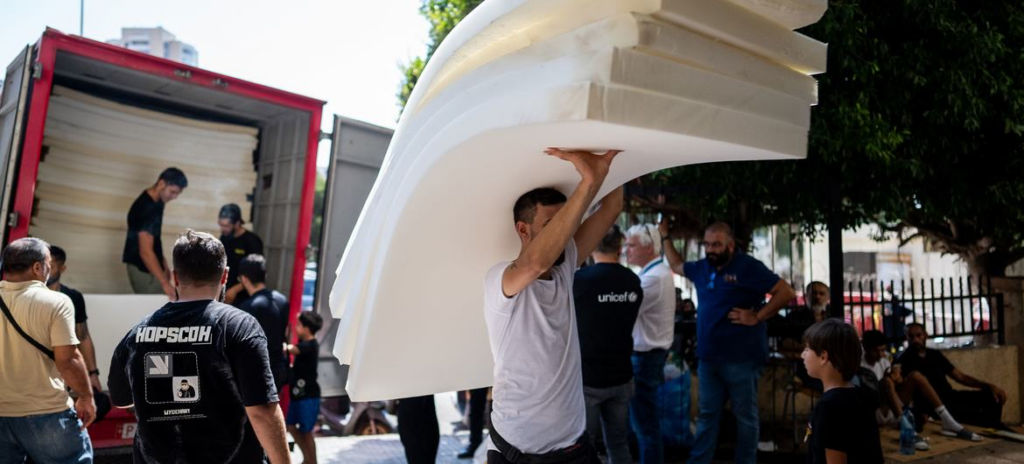Lebanon crisis: Health workers and facilities ‘targeted or hit’

United Nations, 10 October 2024
In Lebanon, health workers and medical facilities have continued to be hit and killed by ongoing Israeli bombardment, a week since Israel sent troops and armoured vehicles into the south of the country and issued evacuation orders, UN humanitarians said on Thursday
The UN aid coordination office, OCHA, reported that ambulances and relief centres had been “targeted or hit in Lebanon, causing further casualties”, adding that the UN health agency WHO and health partners have continued to deliver life-saving surgical supplies to frontline health workers.
International humanitarian law provides special protection for ambulances, healthcare workers and their patients and must not be a target, OCHA insisted in an online update, as Lebanese officials said an Israeli airstrike killed five healthworkers in the south of the country.
According to the UN World Health Organization (WHO), 92 people in Lebanon have been killed and 92 injured in 38 attacks on healthcare in the last year, since Hezbollah rocket fire into northern Israel intensified with the outbreak of war in Gaza.
Hospitals evacuated
Close to 100 health facilities in southern Lebanon have had to close because of Israeli bombardment and ground operations and WHO described five hospitals as “non-functional” and four in areas “facing intense conflict” that were forced to evacuate staff and critical cancer and dialysis patients to other hospitals already at full capacity.
“The protection of civilians and healthcare is a legal and moral imperative that must be upheld,” said Hanan Balkhy, WHO Regional Director for the Eastern Mediterranean. “Attacks on health care cannot continue to be one of the defining marks of conflict in this region.”

In addition to supporting emergency care, health teams from the WHO “are also ramping up efforts to prevent infectious disease outbreaks, focusing on strengthening surveillance, as well as community engagement for early detection and response”, according to an update shared by OCHA.
“Despite ongoing humanitarian efforts, the operational environment remains highly challenging,” OCHA said. “Active hostilities, disrupted supply chains, and physical obstacles – such as damaged infrastructure and road blockages – continue to hamper the delivery of critical, life-saving aid.”
Jabaliya bakery burns down
Dr Balkhy also expressed deep alarm at the catastrophic humanitarian situation in northern Gaza where the Israeli military has stepped up operations and issued new evacuation orders in recent days.
UNRWA, the UN agency for Palestine refugees, announced on Wednesday that it had shut several schools-turned-shelters in northern Gaza as a siege of Jabalia refugee camp enters a sixth day.
Only two of eight water wells in the Jabalya refugee camp remain functional, the UN agency said, while the UN World Food Programme (WFP) warned that the north faces severe shortages of bread and food supplies, as explosive munitions “burned down the only bakery supported by WFP in Jabalya refugee camp”.
No option but to move south
Around 400,000 people are believed to remain in the north of the enclave where hospitals are “overwhelmed and risk going out of service”, according to WHO’s Dr Balkhy.
According to OCHA, checkpoints inside Gaza only allow civilians to move south, while allowing “just a trickle” of humanitarian movement into the north.
Repeated efforts by the UN health agency and OCHA to reach medical teams with relief items and fuel “have been impeded or denied”, Dr Balkhy continued, echoing the dire assessment from WHO Director-General, Tedros Adhanom Ghebreyesus, who said late Wednesday that missions to evacuate critically ill patients from northern hospitals and supply others had been obstructed for two days running.
“WHO missions to evacuate critical patients from Kamal Adwan, Al-Awda and Indonesian hospitals in northern Gaza, to Al-Ahli and Al-Shifa [hospitals], amid hostilities and evacuation orders, were impeded…Another mission is planned for [Thursday].
Tedros noted in an online post that Kamal Adwan and Al-Awda hospitals were only “partially functional” and “struggling due to the shortage of supplies”. The Indonesian hospital cannot accommodate patients as it is “no longer able to provide services”, the WHO chief said, adding that another mission to resupply As-Sahabah hospital in Gaza City “with fuel, blood units and medical supplies” was also denied on Wednesday.
The original article appeared here.